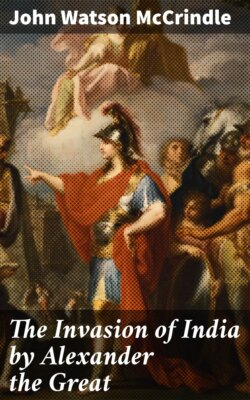Читать книгу The Invasion of India by Alexander the Great - John Watson McCrindle - Страница 29
На сайте Литреса книга снята с продажи.
Chapter IV.—General description of the Indus and of the people of India
ОглавлениеThat the Indus is the greatest of all the rivers of Asia, except the Ganges, which is itself an Indian river; that its sources lie on this side of the Paropamisos or Kaukasos;[74] that it falls into the great sea which washes the shores of India towards the south wind; that it has two mouths, both of which outlets abound with shallows, like the five mouths of the Ister; and that it forms a delta in the land of the Indians closely resembling the Egyptian Delta, and that this is called in the Indian tongue Pâtâla,[75] let this be my description of the Indus, setting forth those facts which can least be disputed, since the Hydaspês and the Akesinês and the Hydraôtês and the Hyphasis, which are also Indian rivers, are considerably larger than any other rivers in Asia, but are smaller, I may even say much smaller, than the Indus, just as also the Indus itself is smaller than the Ganges. Indeed, Ktêsias (if any one thinks him a proper authority) states that where the Indus is narrowest its banks are 40 stadia apart, and where broadest 100 stadia, while its ordinary breadth is the mean between these two distances.[76]
This river Indus Alexander began to cross at daybreak with his army to enter the country of the Indians. Concerning this people I have, in this present work, described neither under what laws they live, nor what strange animals their country produces, nor in what number and variety fish and water-monsters are bred in the Indus, the Hydaspês, the Ganges, and other Indian rivers. Nor have I described the ants which dig up gold for them, nor its guardians the griffins,[77] nor other stories invented rather to amuse than to convey a knowledge of facts, since there was no one to expose the falsehood of any absurd stories told about the Indians. However, Alexander and those who served in his army did expose the falsehood of most of them, although some even of these very men invented lies of their own. They proved also, in contradiction of the common belief, that the Indians were goldless, those tribes at least, and they were many, which Alexander visited with his army; and that they were not at all luxurious in their style of living, while they were of so great a stature[78] that they were amongst the tallest men in Asia, being five cubits in height, or nearly so. They were blacker than any other men except the Aethiopians,[79] while in the art of war they were far superior to the other nations by which Asia was at that time inhabited. For I cannot make any proper comparison between the Indians and the race of ancient Persians, who, under the command of Cyrus, the son of Kambyses, wrested the supremacy of Asia from the Medes, and added to their empire other nations, some by conquest and others by voluntary submission; for the Persians of those days were but a poor people, inhabiting a rugged country and approximating closely in the austerity of their laws and usages to the Spartan discipline.[80] Then with regard to the discomfiture of the Persians in the Skythian land, I cannot with certainty conjecture to what cause it was attributable, whether to the difficult nature of the country into which they were led, or to some other mistake made by Cyrus, or whether it was that the Persians were inferior in the art of war to those Skythians whose territories they invaded.[81]
